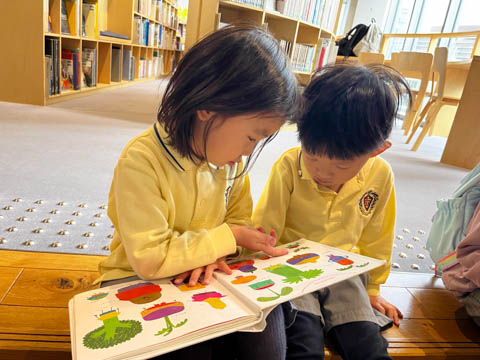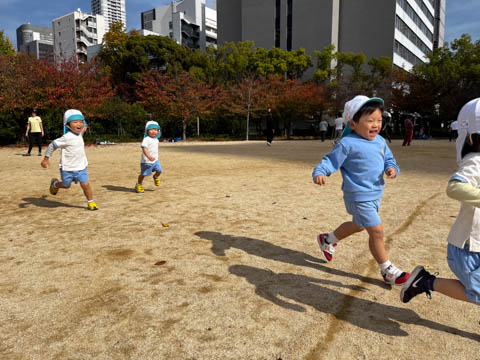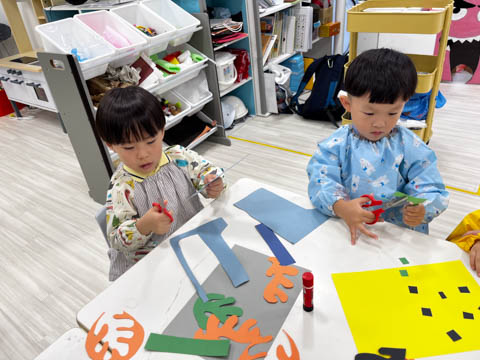Curriculum
Harborfront's Curriculum and Lessons
School System
Pre-Class (1-2 years old)
Full-time, 2-5 days a week, you can choose.
Kinder Class (3-5 years old)
Full-time, 5 days a week.
Annual Goals and Program Themes *Example
| 1st semester | 2nd semester | 3rd semester | |
|---|---|---|---|
| Nursery (1 years old) |
Daily Routine Children become accustomed to living in a group, away from their parents. They will be able to do things on their own. They will develop an interest in familiar things, touch sand and soil, and go to their favorite places to enjoy their favorite games with caregivers. |
Communication Children learn to greet others and understand everyday instructions. They will try to eat by themselves through the experience of seeing, touching, chewing, and tasting various foods. |
Express Your Feelings Can say "no" and "by myself" and can do simple dressing and undressing with caregiver. Can ask and answer simple questions (assertiveness). Can recognize numbers, colors, and objects of different sizes. Beginning to use symbolic functions such as intuition and foresight, and to interact more with people and objects. |
| Toddler (2 years old) |
Sensory Children will enjoy playing with water, sand, mud, clay, and other textures. Recognize upper and lower case letters of the alphabet and phonics. They can sing and dance. They are interested in food and will eat on their own. |
Curiosity Students begin to understand the names of objects, what they are, and when they are used. They can recognize shapes, differences in sound, weight, length, and can imitate favorite phrases from picture books. They will develop an interest in familiar objects and things, and will begin to ask "How?" and "Why?". |
Participate Children develop an interest in using natural objects and various materials, and learn the joy of making things by giving meaning to what they have made. Through outdoor play, children acquire a sense of direction and become aware of traffic rules. They will become more involved with their friends and will enjoy playing together with them. They imitate their family and caregivers. They are able to count from 1-15. Develops daily living habits such as dressing, undressing, and using the toilet. |
| Kinder1 (3 years old) |
Introduction Students start by exploring themselves and their classmates, and learn the joy of expressing themselves. |
Healthy Living This course explores how to stay healthy both physically and mentally. Students learn the importance of exercise, healthy eating habits, and how to cope with illness. |
Interests By visiting different places, students become interested in nature and explore the insects and plants they encounter in different places. They also learn to care about the environment. |
| Kinder2 (4 years old) |
Environment Students learn to recognize the environment around them, including nature, plants and animals, and learn about their impact on that environment and what they can contribute to it. |
Nutritional Education Students learn the importance of food through cooking with friends, eating food they have grown themselves, and experiencing the harvest of food. |
Interests Explore safety at school, at home, in town, at the beach and in the mountains... Students will also learn about natural disasters such as typhoons and earthquakes. |
| Kinder3 (5 years old) |
Explorer Throughout the year, students will use their creativity to create a wide range of stories. Students will learn about a wide range of subjects from nature to outer space. |
Around the World Students will broaden their horizons from their home town to the country and the world, and learn about the culture, language, and holidays in different countries. |
A Story to Tell Children's imaginations will expand to outer space as they listen to others' stories and perspectives, fairy tales, and their favorite stories. They then create and present exciting, original adventure stories. |
Lesson Introduction (1-5 years old)
-
Circle Time
A day at Harbourfront begins with a morning greeting, checking the weather and date, and communicating with the children. To broaden the children's interests, the theme changes each month. Picture books, dance, flash cards, and other activities are age-appropriate and participatory. At age 4, group work is added to provide a forum for exchanging ideas and opinions.
Not only do the children learn familiar English expressions, but they also develop their ability to concentrate and have curiosity to learn, which leads to a desire to learn.

Show and Tell
This is a time to show and tell your favorite toy or picture book in front of your friends with a specific theme.
(e.g.) Bring your favorite stuffed animal and present it in front of your classmates, including its name, how you play with it, and who gave it to you as a gift.
Through the experience of public speaking, presentation skills are acquired from a young age.
-
Hands-on Learning
Hands-on learning, where students can actually see and touch things with their own eyes and hands, stimulates intellectual inquiry more than any other type of learning, and leaves a lasting impression on the memory. At Harbourfront, we actively visit the outside world and nurture a rich sensibility through a variety of experiences.
As part of our experiential learning, we offer work experience. It is never too early for this age, and children are exposed to the joys and difficulties of working from an early age. We visit actual workplaces and interview people who are working there.

Nutrition Education
Nutrition education supports healthy living for children. We stimulate their interest in food not only by eating it, but also by learning about the process by which food becomes ready to eat.
They plant and water their own vegetables on the school's veranda, enjoying the harvest and at the same time developing an appreciation for food.
Cooking lessons mimic the same process of cooking at home and starts with a trip to the store. By looking around at the ingredients, students learn about the season and deepen their knowledge of nutritional balance.
In addition to these special experiences with a purpose, we are also conscious of nutrition education in our meals and daily life at the school.
-
Outdoor Play
We actively encourage children to play outside to build a foundation for their bodies to develop their motor skills.
The purpose of outdoor play is not only to exercise their bodies, but also to gain new knowledge by observing plants and insects, and to learn about traffic rules. On rainy days when it is not possible to play outside, the children exercise on the indoor playground to build their physical strength.

-
P.E. (Physical Education)
Physical education not only builds the body and develops motor skills, but also provides an opportunity to learn how to control emotions and interact with friends in team play. In order to build a strong body, mat exercises, trampolines, and iron bars are used, but by emphasizing gymnastics, children will develop a strong core.
Improved motor skills can prevent injuries and accidents.

-
Swimming
Students attend swimming lessons once a week. The purpose of swimming is to learn how to use all the muscles in the body and to improve physical functions. Swimming increases respiratory function because of the water pressure on the chest, which contributes to making the body less prone to illness.
It also helps students learn how to put on and take off their clothes and learn the rules for using the facilities.

Japanese Language and Culture Education
Our Japanese staff teaches Japanese language and culture. We do not avoid any mention of the Japanese language or culture just because we are an international school. This is because a true international person is not someone who can speak English, but someone who can communicate his or her own culture.
In addition to Japanese manners and etiquette, we also enjoy seasonal events such as Setsubun and Tanabata. In addition, reading and writing hiragana will be introduced from 3-year-olds, and composition and tanka poetry will be introduced for 5-year-olds.
Mandarin Chinese
Learn Mandarin Chinese, the second most influential language in the world after English.
Chinese has the largest number of people using it as a first language in the world, and it has been adopted as one of the official languages of the United Nations, making it a "world language. Chinese also has more than 400 sound combinations, which helps students develop their ability to distinguish sounds. Learning Chinese as well as English is one way to broaden your child's future options, so Harbourfront offers Chinese as an activity in our classes.
Intercultural Learning
We invite guests from other countries to have a chance to interact with them and have the children think about cross-cultural learning. In this age of diversity, children learn about cultures and situations not only in Japan and English-speaking countries, but also in other countries, and talk a lot with people who have different ideas from their own.
When you meet people with different values, you will be able to communicate appropriately if you have learned from cross-cultural experiences as a child. You will gain a lot of awareness as you think about how to live in the midst of all kinds of values.
English Reinforcement Lesson
Children learn to read picture books naturally through age-appropriate lessons based on hands-on learning based on monthly themes. In the lessons, students learn the sound and spelling rules in phonics in a fun way, which native speakers use when learning English. They then learn sight words that do not fall under the rules. By listening to and vocalizing sounds when writing sentences, students will be able to spell words on their own and recognize the difference between tenses (past, present, and future tense).
The goal is to improve reading and writing skills with content related to the season or topic. For example, if the topic is space, students can write sentences about which planets they like and why. They learn about the characteristics of the planets by reading picture books about them and looking up the meanings of new words.
There will be time for Language Focus with a native teacher, where students will learn the correct use of vocabulary and phrases necessary for communication and topics, which they will be able to use naturally in their daily conversations.
-
Art & Craft
Children develop their imagination and creativity by making crafts related to seasons and topics using a variety of materials and supplies.
The experience of using scissors and their hands to create artwork develops their fine motor skills. Their dexterity leads to growth in dressing, undressing, and eating. Concentrating on the completion of a project develops concentration, and completing one thing on one's own gives a sense of accomplishment. They also have the opportunity to teach other children who do not understand, which fosters a sense of helping each other.At Harbourfront, we respect children's individuality based on the idea of "enjoying expressing oneself," and nurture the joy of expressing oneself freely.

Optional Class
We offer a variety of extracurricular classes, all of which are free of charge, except for the "Elementary School Preparation Course". Children can spend quality time with us according to their personalities, abilities, and interests.
-
Every Monday: Programming & Science Lesson (from 3 years old)
In the programming class, we use iPads with apps that even young children can program sensitively. For young children, tablets are tools for watching YouTube videos and playing games at home. However we also use the iPad to develop concentration and a "listening attitude" so that they can listen to what the teacher says in class.
In science lessons, we use a variety of tools and materials to explore the wonders of science. While being amazed at the chemical reactions that occur right in front of their eyes, they expand their learning by seeing, hearing, smelling, touching, and fully engaging their many senses.

-
Every Wednesday: P.E. Lesson (from 3 years old)
P.E. lesson by an outside instructor. The children learn basic physical exercises such as running and jumping, as well as jumping jacks and other motor skills that they cannot acquire in daily life.

Every Wednesday: Elementary School Preparation Course (from 3 years old) *Paid option
Private and national elementary schools want children who want to learn on their own and who enjoy thinking and learning. Rieikai's classes include hands-on learning, presentation time, and time to listen to friends' stories.
In addition to the regular classes, the older students take a test once a month (held at an outside venue) to consolidate their abilities and check their weak points, and steadily prepare for the real examinations.
-
Every Thursday: Art Class (from 1 year old) & Dance Lesson (from 3 years old)
Art Class
Art classes are taught by Harbourfront homeroom teachers and are open to all students from 1 year olds to Kinder children. Using a variety of materials such as paint, marker pens, and colored paper, students learn about the works of artists such as Monet, Picasso, and Andy Warhol while experiencing art in their own way and developing their sensibility and expression. The activities are designed to nurture sensitivity and expressive ability.
Dance Lesson
In dance classes led by the homeroom teacher at Harbourfront, children learn not only to dance happily to music, but also to develop their concentration, basic stamina, sense of rhythm, and self-expression skills. In addition, by dancing together with classmates, students can develop a sense of cooperation.

Every Friday: Eurhythmic Lesson (from 3 years old)
Eurhythmic lessons are given by an outside instructor. A Japanese teacher plays the piano while the children move and sing along with the sounds, and instruments such as tambourines, castanets, and bells are also used.
Baby Class (0 years 6 months and up)
To nurture bilinguals of the future!
Baby Class is a 45-minute fun English lesson that children take with their parents in a relaxed atmosphere from as early as 6 months old.
Our experienced teachers will help parents who are not comfortable with English to naturally join in the English world with their little ones.
Smooth separation of mother and child, enjoyable school debut
Through baby class lessons, children develop an interest in a variety of things, become accustomed to the school environment, and become aware of their surroundings, which helps to ensure a smooth separation between mother and child and helps children develop an ear for English from an early age. We recommend taking this class as a preparation class for the child's debut at school.









